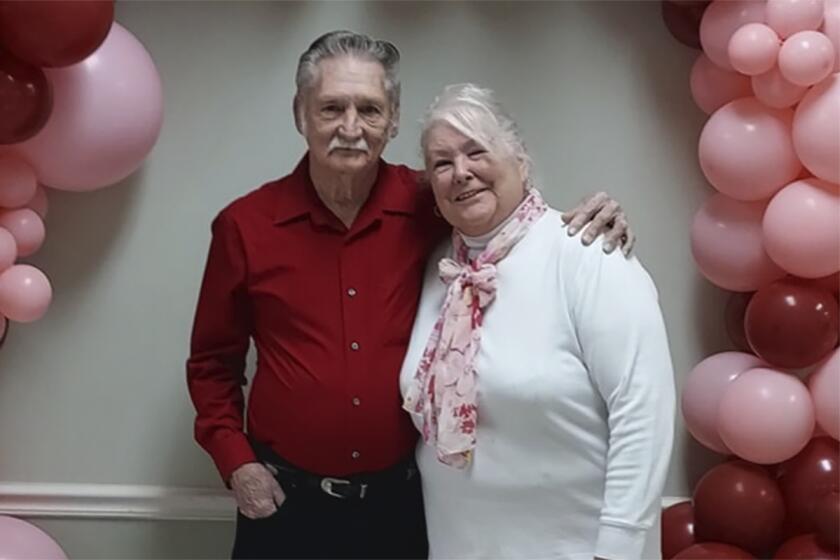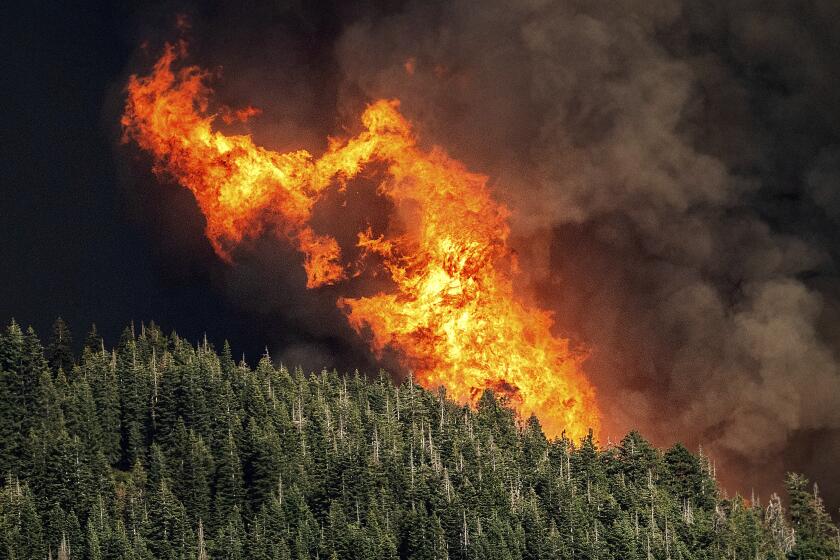Opinion: Helene destroyed my hometown. I don’t want climate change stories of false hope

Last week, as I boarded a plane from the Gulf Coast to NYC Climate Week, I checked the weather for updates on the disturbance that would become Hurricane Helene and called my partner to go over our evacuation plan. When I got off the phone, the man next to me, an evangelical pastor from Alabama, asked if I knew anything about the storm. I told him I work on climate change, and he didn’t bat an eye: “Yeah, it’s getting biblical.”
The hurricane didn’t come for my partner and me this time, but it destroyed my hometown in the mountains of North Carolina. I’ve spent 20 years working on climate and I live between Los Angeles and the Gulf Coast of Alabama, where I’ve reckoned with the likelihood of one day losing our home. I’ve also accepted that worsening fires, droughts and heat waves could make Southern California unlivable. But Asheville was considered a climate haven. I’ve always told family members we can never sell our homes there. It is utterly unfathomable that it would be devastated first by one of the worst climate disasters in U.S. history. Helene showed us nowhere is safe.
I work with screenwriters to depict the climate crisis in TV and film, and what’s happening in western North Carolina feels more like a dystopian movie than real life. My sister lives in Black Mountain, which is where I also lived for most of my 20s and is just outside of Asheville. She’s safe, but floodwaters ravaged the town. A friend was with his son at the farm-to-table restaurant he owns there. The water surged from inches to a chest-deep, raging river so quickly that they literally had to swim for their lives to make it upstairs. Their pet pigs drowned.
Jerry and Marcia Savage are among the more than 150 people confirmed dead in Hurricane Helene. Dozens of them died just like the Savages, when trees fell on homes or cars.
Two neighboring towns — Swannanoa and Chimney Rock — are gone. A friend awoke at 4 a.m. in his girlfriend’s place in Asheville and saw the waters rising at an alarming rate. They narrowly escaped. Her third-floor apartment flooded and she lost everything. Her neighbor lost his life. My sister’s friend had to leap from his window into a tree with his two cats and was stranded there, above violent floodwaters, for eight hours. At least two friends’ homes were swept away. My brother’s community art studio, along with most of the River Arts District, was destroyed. People are trapped with dwindling food and no access to water, hundreds of roads are impassable, helicopters and mules are the only ways to get supplies to many areas, and rescuers can’t locate survivors because people don’t have reliable cell service or power. On Wednesday night, my best friend there texted: “I’m in tears. They’re finding bodies in trees.”
More than 200 people have been confirmed dead. Hundreds are missing. PTSD, suicide, substance abuse and depression spike significantly after climate disasters. The pillars of western North Carolina’s economy — tourism, art and agriculture — are shut down for the foreseeable future. The cleanup and rebuilding efforts are on track to take tens of billions of dollars and many years. Some places will never come back.
Scientists estimate that climate change increased Hurricane Helene’s rainfall by up to 50% in parts of the Carolinas and Georgia, dumping more than 40 trillion gallons of water. At NYC Climate Week, the annual awareness event held alongside the U.N. General Assembly, the disconnect from this shattering reality was surreal. There were fancy parties, cheerful sun imagery and giant signs reading “HOPE.” The dominant theme was: We can solve this! We need to tell hopeful climate stories! But there’s no “solving” a hurricane wiping out western North Carolina, hundreds of miles from the sea. Only focusing on optimism is like telling a cancer patient that everything will be OK if they just stay positive. At best, it comes across as out of touch; at worst, it feels callous. Yes, we can still prevent the worst impacts and must demand our governments scale solutions and act urgently, but we cannot minimize the horrors unfolding now, or that it will get worse in the coming years.
I see the fierce protectiveness of parents for their families. Their votes this fall can help mitigate wildfire, pollution and extreme heat, which can devastate their kids’ health.
Fossil fuel executives have known since the 1970s that burning oil, coal and gas would cause escalating climate catastrophes and worldwide suffering. Yet they lied, sacrificed our safety for their greed and just unleashed an apocalypse on my hometown. Their actions will condemn children today to a planet that’s more hell than Earth by the end of the century if we don’t stop them. It isn’t just a tragedy; it’s a crime against humanity.
What’s happening in North Carolina doesn’t feel real. I have no emotional framework for this, no story to help me. Right now, what I desperately need are authentic stories that help us figure out how to be human in this changing world, to face this overwhelming crisis with bravery. Stories that help us navigate our very understandable fear, anxiety, grief, despair, uncertainty and anger in a way that allows us to feel seen. Stories that make us laugh — not in ignoring our reality, but in the midst of it — and stories that remind us there’s still so much beauty here to fight for. That capture how, in the living nightmare of climate disasters, people demonstrate extraordinary kindness and creativity, as they’re doing in Asheville and Black Mountain at this very moment. And we need stories that expose the guilt of the fossil fuel industry.
I need help making meaning of all this, and stories have always been how humans make sense of our world. But as I grieve an unimaginable loss, the last thing I want are optimistic stories about hope. As climate scientist Kate Marvel says: “We need courage, not hope, to face climate change.”
Anna Jane Joyner is the founder and chief executive of the story support nonprofit Good Energy.
More to Read
A cure for the common opinion
Get thought-provoking perspectives with our weekly newsletter.
You may occasionally receive promotional content from the Los Angeles Times.











